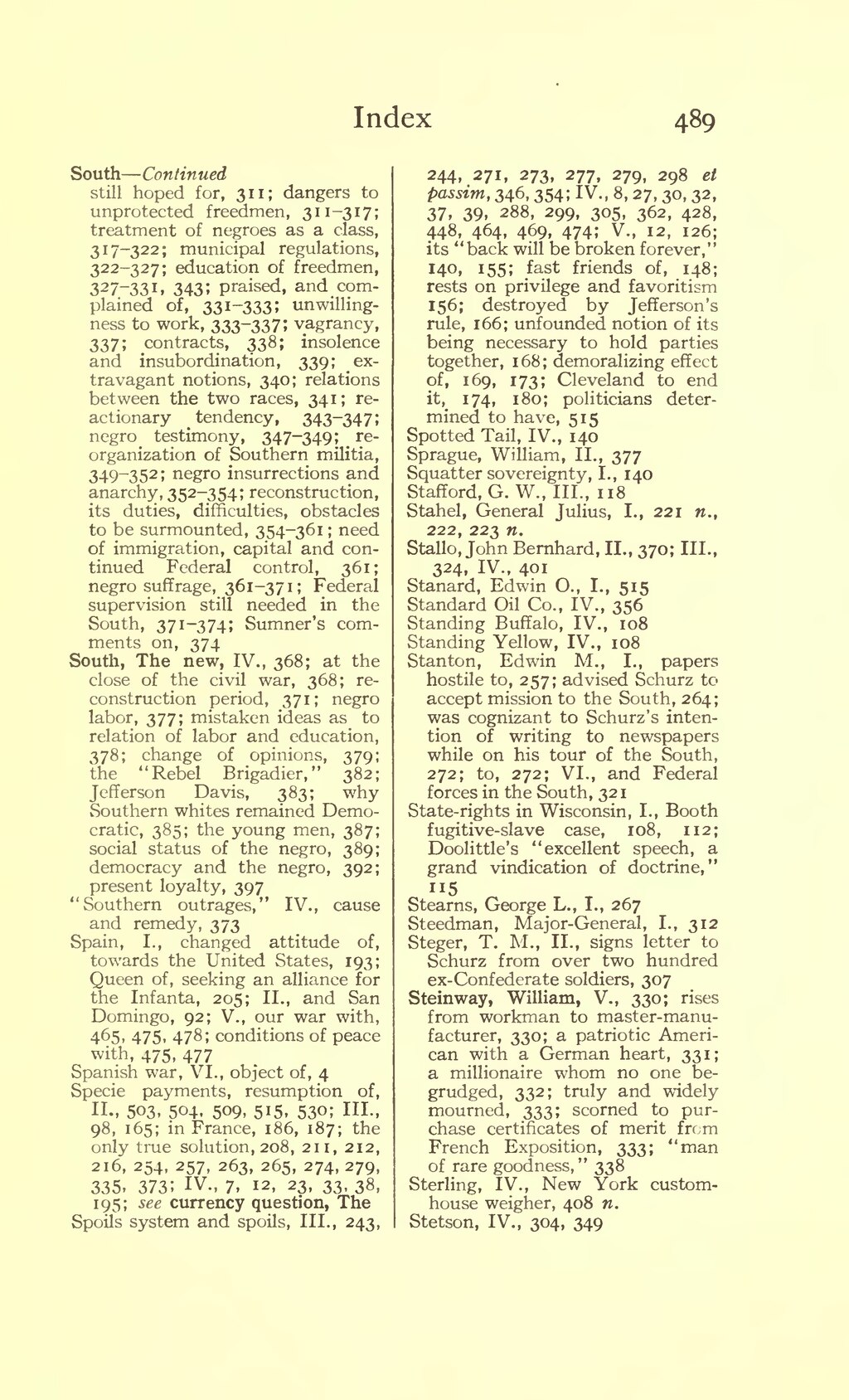South—Continued
still hoped for, 311; dangers to
unprotected freedmen, 311-317;
treatment of negroes as a class,
317-322; municipal regulations,
322-327; education of freedmen,
327-331, 343; praised, and
complained of, 331-333; unwillingness
to work, 333-337; vagrancy,
337; contracts, 338; insolence
and insubordination, 339;
extravagant notions, 340; relations
between the two races, 341;
reactionary tendency, 343-347;
negro testimony, 347-349;
reorganization of Southern militia,
349-352; negro insurrections and
anarchy, 352-354; reconstruction,
its duties, difficulties, obstacles
to be surmounted, 354-361; need
of immigration, capital and
continued Federal control, 361;
negro suffrage, 361-371; Federal
supervision still needed in the
South, 371-374; Sumner's
comments on, 374
South, The new, IV., 368; at the close of the civil war, 368; reconstruction period, 371; negro labor, 377; mistaken ideas as to relation of labor and education, 378; change of opinions, 379; the “Rebel Brigadier,” 382; Jefferson Davis, 383; why Southern whites remained Democratic, 385; the young men, 387; social status of the negro, 389; democracy and the negro, 392; present loyalty, 397
“Southern outrages,” IV., cause and remedy, 373
Spain, I., changed attitude of, towards the United States, 193; Queen of, seeking an alliance for the Infanta, 205; II., and San Domingo, 92; V., our war with, 465, 475, 478; conditions of peace with, 475, 477
Spanish war, VI., object of, 4
Specie payments, resumption of, II., 503, 504, 509, 515, 530; III., 98, 165; in France, 186, 187; the only true solution, 208, 211, 212, 216, 254, 257, 263, 265, 274, 279, 335. 373; IV., 7, 12, 23, 33, 38, 195; see currency question, The
Spoils system and spoils, III., 243, 244, 271, 273, 277, 279, 298 et passim, 346, 354; IV., 8, 27, 30, 32, 37, 39, 288, 299, 305, 362, 428, 448, 464, 469, 474; V., 12, 126; its “back will be broken forever,” 140, 155; fast friends of, 148; rests on privilege and favoritism 156; destroyed by Jefferson's rule, 166; unfounded notion of its being necessary to hold parties together, 168; demoralizing effect of, 169, 173; Cleveland to end it, 174, 180; politicians determined to have, 515
Spotted Tail, IV., 140
Sprague, William, II., 377
Squatter sovereignty, I., 140
Stafford, G. W., III., 118
Stahel, General Julius, I., 221 n., 222, 223 n.
Stallo, John Bernhard, II., 370; III., 324, IV., 401
Stanard, Edwin O., I., 515
Standard Oil Co., IV., 356
Standing Buffalo, IV., 108
Standing Yellow, IV., 108
Stanton, Edwin M., I., papers hostile to, 257; advised Schurz to accept mission to the South, 264; was cognizant to Schurz's intention of writing to newspapers while on his tour of the South, 272; to, 272; VI., and Federal forces in the South, 321
State-rights in Wisconsin, I., Booth fugitive-slave case, 108, 112; Doolittle's “excellent speech, a grand vindication of doctrine,” 115
Stearns, George L., I., 267
Steedman, Major-General, I., 312
Steger, T. M., II., signs letter to Schurz from over two hundred ex-Confederate soldiers, 307
Steinway, William, V., 330; rises from workman to master-manufacturer, 330; a patriotic American with a German heart, 331; a millionaire whom no one begrudged, 332; truly and widely mourned, 333; scorned to purchase certificates of merit from French Exposition, 333; “man of rare goodness,” 338
Sterling, IV., New York customhouse weigher, 408 n.
Stetson, IV., 304, 349
